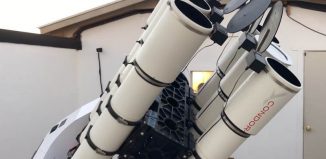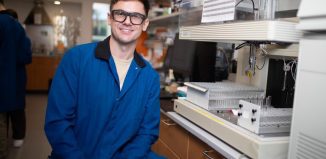BNL’s Brady calls on chemistry to battle would-be bombers
Working on three stopping points, scientist tries to anticipate terrorists’ next move
One day, Joseph Brady hopes he’s unemployed. He doesn’t hate his job, but he wishes it weren’t necessary. Brady teams up with law enforcement — the Suffolk County Police Department and the Federal Bureau of Investigation — to prevent those bent on blowing things up from succeeding.
Brady, who joined the Nonproliferation and National Security Department staff at Brookhaven National Laboratory last summer, is a chemist who specializes in explosives. He explained that there are three potential points when law enforcement can stop the “bad guys” (a term he uses to describe would-be bombers).
First, law enforcement can prevent them from making explosives. They can interfere with one of the key ingredients — even a household product — in making deadly weapons. He calls this process denaturing explosive precursors.
Brady has put additives in hydrogen peroxide — yes, the same liquid parents apply to skinned knees after their kids fall off a bicycle — that make it less reactive with other chemicals. Those additives don’t interfere with the disinfectant’s intended use.
The second stopping point is in detection. Once an explosive is made, law enforcement may be able to detect it at airports, bridges, tunnels and other areas he calls “choke points.” Brady mimics the way bad guys manufacture explosives and studies the results. He looks at the properties, searching for byproducts that might be indicative of illicit activities. He examines how current detection technologies respond to these materials.
The third stopping point is to figure out how to get rid of a device once it’s detected — without allowing it to explode. Scientists can accomplish this by stabilizing the materials in the device or by introducing some new element that could “chemically digest the explosives.”
Brady has worked with triacetone triperoxide, the common homemade explosive that was part of the shoe bomber’s device. Attempting to move TATP could result in an unintended detonation because it’s so unstable. As part of Brady’s dissertation, he showed that chemists can destroy TATP on the 100-gram scale without detonation by using combinations of commonly available chemicals.
Brady, whose research is funded in part by the Department of Homeland Security, explained that “Bad guys are always finding new materials to use against us. A lot of times, they find old materials that have no value to military or commerce.”
He pointed to nitrate esters as one explosive he expects to see “on the scene.” Brady is working on ways to detect the presence of these homemade explosives.
Brady feels he’s playing a type of cat and mouse game with would-be terrorists, trying to anticipate what they’ll do next. Fortunately, he said, he’s working with a team of skilled law enforcement officials who offer suggestions.
“It’s a feedback loop,” he explained. Law enforcement “comes with a question, he provides an answer, then they have a new question.”
While Brady plans to conduct lab experiments with chemicals that can create explosives, the amount of materials he uses is on the order of milligrams — the equivalent of a few grains of salt. He’s unlikely to see explosive reactions that could cause any of the destruction he’s trying to prevent.
Brady, who worked on chemotherapeutic agents in college at the University of Rhode Island, studied explosives when he realized he could play a role in protecting people.
“You see that the bad guys are trying to do something and you can do something about it,” he said. “They are always working hard, so you try to work harder.”
Brady earned his Ph.D. from the University of Rhode Island. He’s been writing for grants to build his lab. The proximity of BNL to New York City and Washington, D.C. makes it an ideal resource for national law enforcement, he said.
Brady was involved with the FBI and the Suffolk County Police Department in presenting a class for Transportation Security Administration screeners on explosiveness awareness. Because BNL is on a former Army installation, the Suffolk County police could use an old grenade range to show TSA officials how the homemade, commercial and military explosives work.
Brady, who is not married, said when he’s not working to build his lab, he enjoys visiting beaches on the North and the South Shore.
Brady said his father, John, a counselor for troubled children, and his mother, Judi, a psychologist, are supportive of his work.
“They are proud,” he offered. “They say, ‘Good for you. Go get ’em.’”






